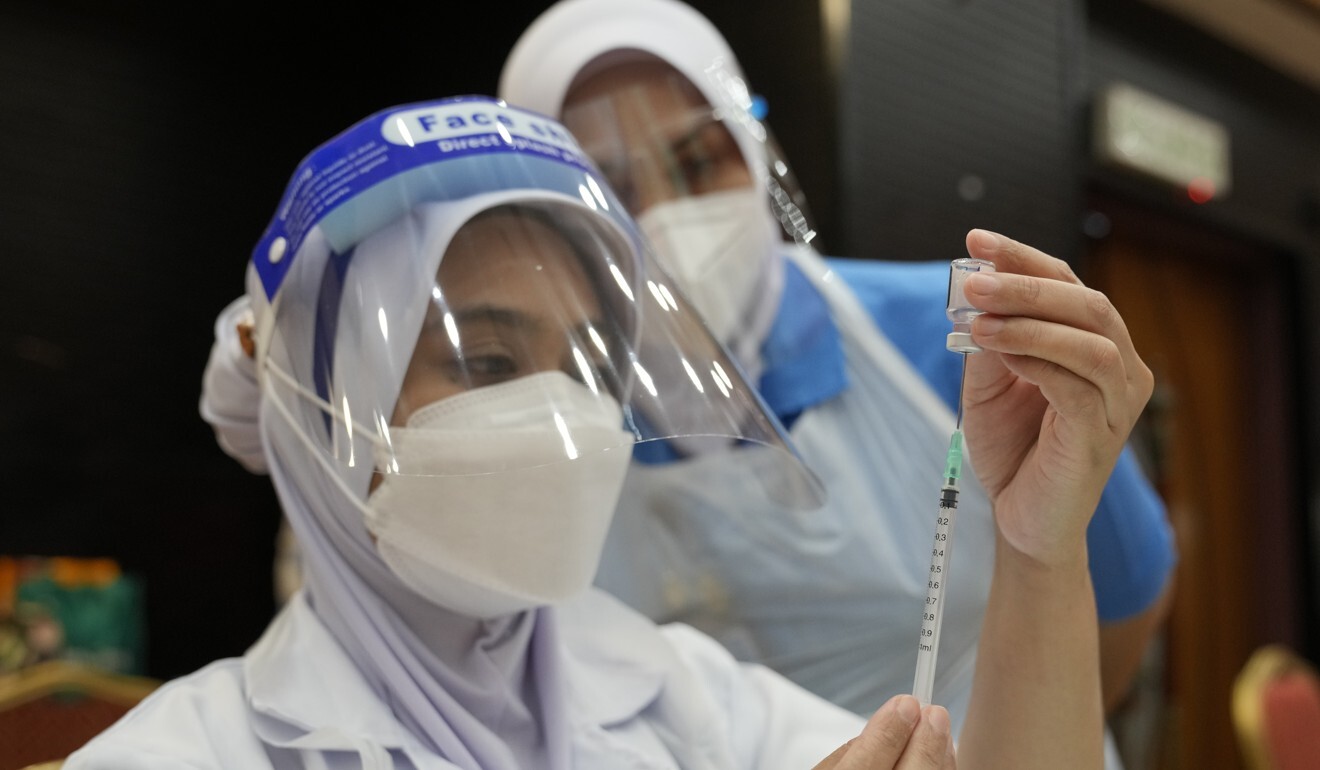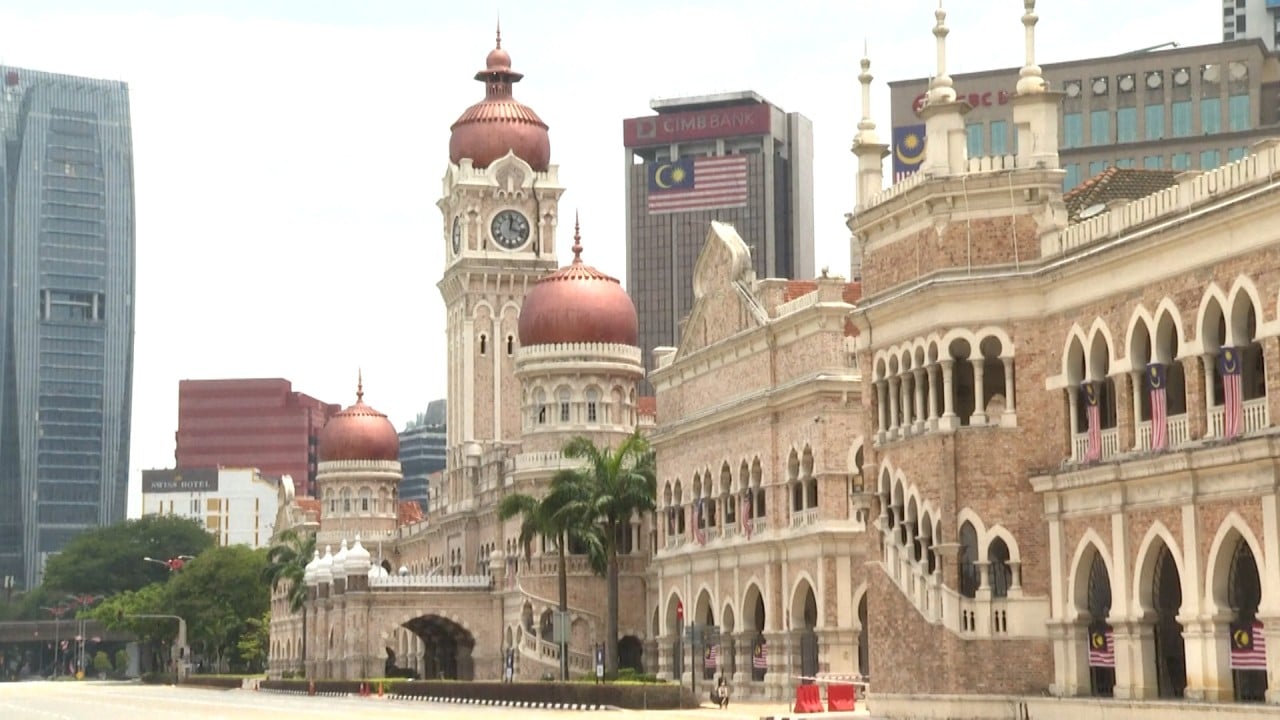
China’s vaccine diplomacy in Malaysia: problems and prospects amid the pandemic
- Malaysia is enduring a devastating fourth wave of Covid-19, but China-made vaccines have been relegated to a secondary role over efficacy concerns
- Nevertheless, their inoculations are more readily available, affordable, and easier to administer, making them crucial in developing countries
The Delta variant is crippling efforts to flatten the curve, and the number of daily infected cases has risen past 23,000 per day. There are now more than 1.3 million cumulative infections, and the casualty toll has passed the grim 13,000 milestone.
An ineffective lockdown has been blamed for the worsening situation, reflecting the government’s failure to strike the right balance between saving lives and saving livelihoods, while the inconsistent enforcement of movement control orders undermined public confidence in the government.
Malaysia’s ex-PM Najib Razak may seek re-election to parliament despite conviction over 1MDB scandal
However, concerns over these vaccines’ relative effectiveness have led to China’s Sinovac being relegated to a secondary role in Malaysia’s national immunisation programme.
All the same, China’s vaccine diplomacy remains crucial when it comes to containing the Covid-19 pandemic in Malaysia and other developing countries, because China continues to produce vaccines that are more readily available, affordable, and easier to administer.
China’s vaccine diplomacy
At the onset of the pandemic, China adopted “face-mask diplomacy”, and sent Malaysia shipments of pharmaceutical supplies, hospital equipment, and medical personnel. Later, as the vaccination campaign got under way, Beijing promised Putrajaya supplies of its vaccines.
In February, the first batch of Sinovac was received in a high-profile airport ceremony. The minister in charge of the NIP, Khairy Jamaluddin, became the first recipient of the Sinovac jab in a show of confidence in the vaccine. All tranches of Sinovac were subsequently delivered on schedule; by July, Malaysia had received 12 million doses of the inoculation, 500,000 shots of which were donated. The previous month, two additional Chinese vaccines, CanSino and Sinopharm, were added to the list of vaccines awaiting approval for emergency use in Malaysia.

Despite Beijing’s enthusiastic outreach, its vaccine diplomacy is hitting some speed bumps. One issue pertains to the halal status of Sinovac. In a related development, Saudi Arabia granted permission to those vaccinated with Sinovac to undertake the pilgrimage to Mecca on condition they received a booster from an authorised vaccine. Underpinning this qualified approval was the deeper concern and pervasive perception of Sinovac’s relatively low effectiveness.
International bodies expressed worries over the lack of transparency where Sinovac’s clinical trials were concerned. Accurate assessments of China’s vaccine performance in real-life situations were also stymied by shortage of data. Together with anecdotal accounts of subpar performance, these criticisms fanned public apprehension that eventually led to the removal of Sinovac from Malaysia’s NIP list. Pfizer is now the sole vaccine anchoring the remaining phases of Malaysia’s national immunisation campaign.
Malaysian mums urge PM to take a stand as children’s citizenship continue being in limbo
China’s vaccine diplomacy in Malaysia is not happening in a vacuum; it is taking place amid bilateral tensions, the most serious of which concern sovereignty claims in the South China Sea. That said, leaders from both countries have thus far been able to compartmentalise these contentions to pursue broader common interests such as those within the Belt and Road Initiative.
China’s overture to Malaysia is also taking place against the backdrop of increasingly tense big power rivalry. In July, the US and Japan stepped up their vaccine diplomacy, each donating to Malaysia their spare inventory of 1 million doses of the Pfizer and AZ vaccines respectively; in August, Malaysia received a contribution of 415,000 doses of AstraZeneca from England. Vaccine diplomacy is now the new arena for soft power contestation, as geopolitical rivals compete for dominance and influence in countries such as Malaysia.
Vaccine equity and strategy
Concerns over low efficacy and big power rivalry notwithstanding, China’s vaccines remain a vital component in the global fight against Covid-19. This is largely because they are some of the more accessible, relatively affordable, and easier vaccines to administer.

02:13
Malaysia eases Covid-19 rules as it seeks to boost inoculation with China’s one-dose vaccine
By comparison, in the West, the devastating virus outbreak early in the pandemic meant vaccine production was mostly retained for use at home. Some observers have faulted the wealthy vaccine-producing countries for unconscionable export bans and hoarding, with widespread reports of stockpiles being left unused and disposed of once past their expiration date.
Malaysia’s political ceasefire shows early signs of promise. How long will it last?
In Malaysia, the government decided at the outset to keep immunisations free of charge to ensure every citizen was guaranteed equal access to the vaccine. Amid global talk of a booster shot, the WHO has pleaded with richer nations to hold off from offering supplementary jabs to allow low-income countries access to vaccine supplies.
These supply issues have also bedevilled the WHO’s Covax Facility, which was aimed at pooling resources and distributing vaccines to the developing world. Malaysia, for example, has complained of the long waiting time where Covax is concerned, and some countries are approaching vaccine makers directly, bypassing the Covax programme altogether.
When it comes to pricing, as state-owned enterprises, Chinese manufacturers have shown greater latitude over subsidies and have organised more competitive packages. In Malaysia, the Sinovac deal allows the “fill-and-finish” process to be carried out locally, to facilitate technological transfer and an opportunity for Malaysia “to buy at a good price”, according to vaccine minister Khairy.
Despite this, Pfizer is Malaysia’s preferred vaccine and the government is negotiating a new contract that is expected to further strain the country’s finances amid reports the inoculation’s price is going up.
‘Good enough’
Another outlay often overlooked in the vaccination roll-out are the handling costs. The inoculation process requires supporting facilities for transport, storage and administration of the shots. This is a difficulty most pertinent where Pfizer and Moderna are concerned, as these mRNA vaccines require ultra-cold refrigeration. All the other vaccines, including China’s Sinovac, need only standard refrigeration, making them easier and less costly to handle.

In Malaysia, for example, the one-shot CanSino vaccine will be used to inoculate villagers living in the remote interiors of Sabah and Sarawak.
On top of this, a key feature of China’s vaccine diplomacy, is its role in the broader Health Silk Road, an offshoot of Beijing’s belt and road plan.
President Xi has framed the HSR as a “global public good” initiative to strengthen regional and global health governance. The aim is to build an integrated network of health care and medical aid infrastructure. In the current vaccine drive in Indonesia and the United Arab Emirates, for instance, in addition to harnessing local vaccine-production capacities, plans are afoot to also set up research and development facilities for medical training and scientific research. Some observers have ascribed these investments as part of China’s “medical diplomacy” to develop a comprehensive international health care ecosystem to better prepare the world for future pandemics.
Malaysia and Indonesia warn Australia’s Indo-Pacific pact could trigger nuclear arms race
By contrast, aside from its one-off donation of Pfizer doses, it remains unclear what the US’ longer-term commitment and next course of action is in assisting countries such as Malaysia to recover from the pandemic.
That said, the G7’s recently launched Build Back Better World (B3W) initiative may provide an opening for the US to maintain a strategic longer-range engagement with the developing world.
The B3W’s stated goal is to generate uplift across a broad spectrum of industries, including the medical sector and public health care. If actualised, this US-led initiative can play a pivotal role in reviving the pandemic-stricken global economy.
Still, although they are not considered the most efficacious, China’s “good enough” vaccine, the only one available in some lower-income countries, is crucial in curbing the global spread of the lethal virus.
But China’s effort alone is not enough. As the world continues to face an acute shortage of vaccines, and with the crisis fast transmuting into a two-track pandemic of haves and have-nots, the richest nations can and should do more in helping the poorest.
Peter T.C. Chang, is deputy director of the Institute of China Studies, University of Malaya. This is an edited excerpt from an article titled “China’s Vaccine Diplomacy in Malaysia: Problems and Prospects”, first published in ISEAS Perspective 2021/121.

